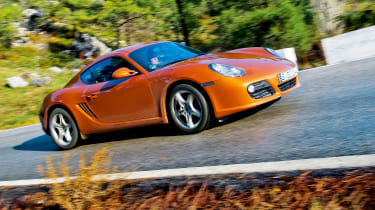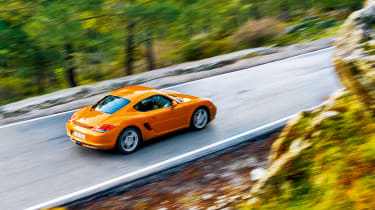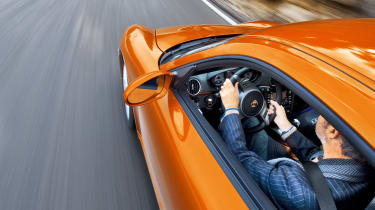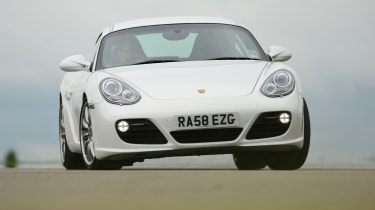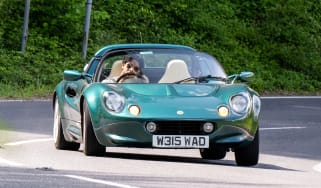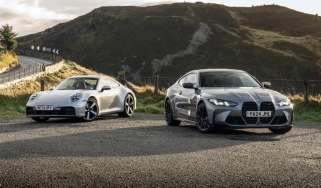Porsche Cayman (987, 2005 - 2012): review, history, prices and specs
The 987 Porsche Cayman is the obvious choice in 2024 as a used buy, and for many very good reasons...
Everything feels in harmony behind the wheel of a 987-generation Porsche Cayman S. The push from its mid-mounted flat-six, the precise shift action of its six-speed manual gearbox and the fluidity of its chassis meld together to create what is a wonderfully balanced coupe experience. It was good in 2005, and with new compact, naturally aspirated sports cars now few and far between, it feels even better today.
The Cayman wasn’t – and arguably still isn’t – as instantly desirable as a 911. It lacks the esteemed motorsport pedigree, design character and idiosyncratic rear-engine layout. Drive one, however, and it’s immediately apparent that it can teach a Carrera a trick or two dynamically. The Cayman feels as neat and alert as its rear-engined big brother but provides a more natural balance and precision thanks to its mid-engined layout. Commit hard and you feel all four tyres being worked into the road surface, the fronts biting harder as you turn in, the rears energised on the way out, the whole car malleable and rewarding as it dances beneath you.
> Porsche 911 GT3 review (991, 2013-2016): review, specs and buying guide
Like the 911, the Cayman has steadily evolved over its lifespan, but the original 987-generation models (2005-12) possibly represent the recipe at its purest. Information seeps through every control, but particularly the hydraulically assisted steering, which was abandoned for an EPAS set-up in the subsequent 981. The entry-level Cayman offers a sweet chassis but lacks ultimate power from its 2.7-litre flat-six to work it hard, so the S version would be our pick. With a larger 3.4-litre engine generating 291bhp, the S feels brawnier and more vivid under acceleration.
In 2009, the S received comprehensive changes as part of its Gen 2 makeover, including the aforementioned 'Mezger' power unit being swapped for an all-new 316bhp DFI motor. Meanwhile Porsche’s new seven-speed PDK gearbox replaced the old five-speed Tiptronic as the auto option, and a limited-slip differential became available too. The 987.2 also introduced the fabulous Cayman R, which provided a small taste of what the package was capable of with less weight (55kg lighter), more power (9bhp) and a grittier focus (it sat 20mm lower on stiffer, retuned suspension). The trouble is, today an R costs around 50 per cent more than a tidy facelifted S, which in turn represents excellent value, starting from around £19,000.
The Gen 2 version is the safest bet in terms of reliability, since they are less prone to the bore scoring that’s notorious with some earlier Mezger units. This can be identified by high oil consumption or one of the twin tailpipes being dirtier than the other: the scoring tends to occur on the second cylinder bank, and the poor seal between the bores and piston rings results in dark exhaust deposits on that side. Pre-facelift models can also be prone to intermediate shaft bearing failure, while the DFI engine of the facelifted 987 eliminated the IMS altogether to solve the issue. Otherwise, the 987 is robust and covers a wide bandwidth, from road driving to circuit work. It’s one of the finest sports cars of this century.
What we thought
'Pull the door shut with a thunk, twist the key and hear the flat-six wake with a mellow, crisp howl; snick the gearlever into first and feel the precision of the clutch and accelerator. Yep, it’s a proper Porsche. As you move away you’ll notice the tight, controlled way in which the Cayman absorbs the road surface, letting you know just enough about what’s under-tyre whilst filtering out the really nasty stuff. You’ll feel the rigidity of the structure, the way the Cayman seems impervious to the sort of ravaged roads that would have something like a Z4 Coupe bouncing and weaving all over the place. Maybe that price-tag isn’t so over-inflated.
But, and it is a very big but… when you’ve felt just how fluid and capable the chassis is, you desperately crave more power. The 2.7-litre flat-six sounds wonderful and delivers just enough oomph if you can keep it wound tight, but find yourself in the wrong gear as you pull out to overtake another lumbering truck and the Cayman feels… slow.
Can a 160mph car feel slow? When a chassis has such control, such grip and unimpeachable traction and when the engine it’s married to delivers its best when it’s singing towards the rev-limiter, yes it can. The truth is that something like a Focus ST actually feels quicker than the Cayman for much of the time.
Of course if all roads were deserted, clear-sighted and strewn with tricky, medium- and high-speed corners, then the Cayman might just be one of the most entertaining cars you’d ever find. It has glorious steering feel, a nimble, faithful front end that gradually bleeds into understeer at the limit, and with the PASM on its stiffest setting it develops a bit of attitude, the front bobbing 911-style and the rear hunkered down and driving hard into the road. But in the real world, despite all those usual Porsche strengths, it can feel a bit underwhelming.' – Jethro Bovingdon
Porsche Cayman (987) specs
| Engine | Flat-six, 2687cc |
| Power | 241bhp @ 6500rpm |
| Torque | 201Ib ft @ 4600-6000rpm |
| Weight | 1300kg |
| Power-to-weight | 185bhp/ton |
| 0-62mph | 6.1sec |
| Top speed | 160mph |
| Price new | £36,220 |
| Value today | From £13,000 |
